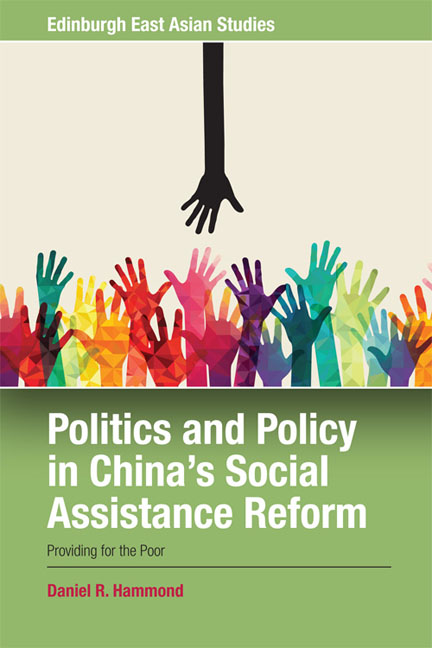Book contents
- Frontmatter
- Contents
- Acknowledgements
- Note on Chinese and Translations
- Glossary of Terms and Abbreviations
- Introduction
- 1 Historical Background to Dibao and the Question of Poverty in China
- 2 Urban Dibao: Emergence and Transition to National Policy, 1992–1999
- 3 Urban Dibao: The Resolution of Unwanted and Unintended Outcomes, 1999–2003
- 4 Rural Dibao: The Countryside and Fragmentation
- 5 Institutionalisation? Achieving Policy in a Fragmented State
- Conclusion
- Appendix: Interview List
- Bibliography
- Index
1 - Historical Background to Dibao and the Question of Poverty in China
Published online by Cambridge University Press: 18 December 2019
- Frontmatter
- Contents
- Acknowledgements
- Note on Chinese and Translations
- Glossary of Terms and Abbreviations
- Introduction
- 1 Historical Background to Dibao and the Question of Poverty in China
- 2 Urban Dibao: Emergence and Transition to National Policy, 1992–1999
- 3 Urban Dibao: The Resolution of Unwanted and Unintended Outcomes, 1999–2003
- 4 Rural Dibao: The Countryside and Fragmentation
- 5 Institutionalisation? Achieving Policy in a Fragmented State
- Conclusion
- Appendix: Interview List
- Bibliography
- Index
Summary
Introduction
As with any policy area, social assistance in China does not develop in a historical vacuum. The weight of precedent, established vested interests and the emergence of particular policy paths are all consequences of a policy's history. In addition, how a policy's story is told and later relayed can go a long way to shaping how it is responded to and the extent to which it is deemed successful. The MLG system in China has been heavily influenced by its own history as well as the preceding history of social assistance. A final point to consider is the way in which the problem that a particular policy is addressing is defined or measured and the ways in which this has developed over time. The following discussion has three main aims. First, the chapter will introduce the historical background to social assistance in China. This will not be a comprehensive history of social assistance in China before the 1990s, but it will provide readers with a background to developments which have, to varying degrees, influenced the more contemporary developments of dibao. Second, the chapter will provide a review of the development of dibao from 1992 to approximately 2014. The intention of this part of the chapter is to provide readers with a broad understanding of the developmental events which occurred during this period regarding both urban and rural dibao but not to provide the details and argument which subsequent chapters will explore. Instead, this section will provide readers with the context in which to situate the subsequent discussion. The third and final part of the chapter takes a different tack and will discuss the ways that poverty is defined and the ways in which the problem has developed during the period that dibao has been practised. The chapter therefore follows a straightforward structure addressing, first, the history of social assistance prior to the reform era, which is then followed by a more detailed discussion of the development of the dibao from 1992 through to 2014. Third, and finally, the chapter will discuss how poverty has changed in China during the reform era.
- Type
- Chapter
- Information
- Politics and Policy in China's Social Assistance ReformProviding for the Poor?, pp. 21 - 45Publisher: Edinburgh University PressPrint publication year: 2018



